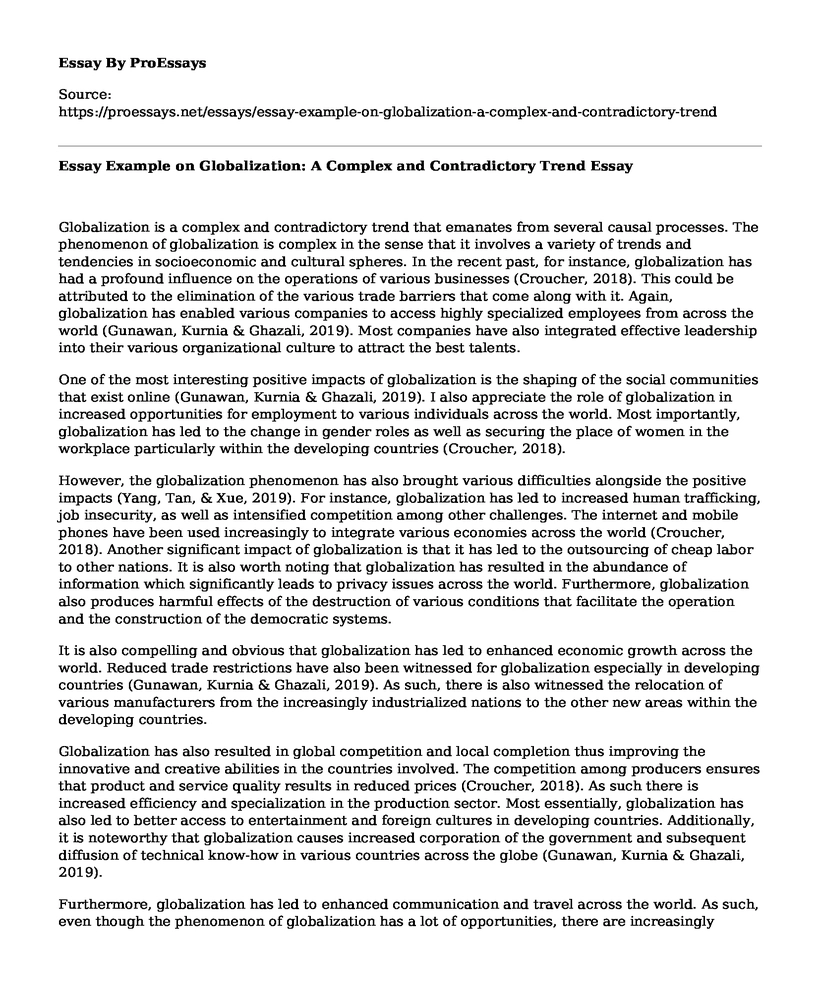Globalization is a complex and contradictory trend that emanates from several causal processes. The phenomenon of globalization is complex in the sense that it involves a variety of trends and tendencies in socioeconomic and cultural spheres. In the recent past, for instance, globalization has had a profound influence on the operations of various businesses (Croucher, 2018). This could be attributed to the elimination of the various trade barriers that come along with it. Again, globalization has enabled various companies to access highly specialized employees from across the world (Gunawan, Kurnia & Ghazali, 2019). Most companies have also integrated effective leadership into their various organizational culture to attract the best talents.
One of the most interesting positive impacts of globalization is the shaping of the social communities that exist online (Gunawan, Kurnia & Ghazali, 2019). I also appreciate the role of globalization in increased opportunities for employment to various individuals across the world. Most importantly, globalization has led to the change in gender roles as well as securing the place of women in the workplace particularly within the developing countries (Croucher, 2018).
However, the globalization phenomenon has also brought various difficulties alongside the positive impacts (Yang, Tan, & Xue, 2019). For instance, globalization has led to increased human trafficking, job insecurity, as well as intensified competition among other challenges. The internet and mobile phones have been used increasingly to integrate various economies across the world (Croucher, 2018). Another significant impact of globalization is that it has led to the outsourcing of cheap labor to other nations. It is also worth noting that globalization has resulted in the abundance of information which significantly leads to privacy issues across the world. Furthermore, globalization also produces harmful effects of the destruction of various conditions that facilitate the operation and the construction of the democratic systems.
It is also compelling and obvious that globalization has led to enhanced economic growth across the world. Reduced trade restrictions have also been witnessed for globalization especially in developing countries (Gunawan, Kurnia & Ghazali, 2019). As such, there is also witnessed the relocation of various manufacturers from the increasingly industrialized nations to the other new areas within the developing countries.
Globalization has also resulted in global competition and local completion thus improving the innovative and creative abilities in the countries involved. The competition among producers ensures that product and service quality results in reduced prices (Croucher, 2018). As such there is increased efficiency and specialization in the production sector. Most essentially, globalization has also led to better access to entertainment and foreign cultures in developing countries. Additionally, it is noteworthy that globalization causes increased corporation of the government and subsequent diffusion of technical know-how in various countries across the globe (Gunawan, Kurnia & Ghazali, 2019).
Furthermore, globalization has led to enhanced communication and travel across the world. As such, even though the phenomenon of globalization has a lot of opportunities, there are increasingly negative impacts that could be adopted to criticize the benefit aspect of globalization (Croucher, 2018). In my opinion, globalization tends to have more benefits to the industrialized countries compared to the developing countries. The uneven impacts of globalization can be observed between countries such as China and India (Gunawan, Kurnia & Ghazali, 2019).
In developing countries, globalization has been seen to have a negative impact on increased poverty. The benefits of globalization are only enjoyed by a small number of countries (Croucher, 2018). However, many other countries still remain excluded from the benefits that come along with globalization. In this light, it results in wealth redistribution such that the rich countries remain richer while the poor countries become poorer (Gunawan, Kurnia & Ghazali, 2019).
References
Croucher, S. (2018). Globalization and belonging: The politics of identity in a changing world. Rowman & Littlefield.
Gunawan, A., Kurnia, S. G., & Ghazali, H. (2019). The Impacts of Globalization on Human Resource Development Management. Social Economics and Ecology International Journal, 3(1), 5-10. Retrieved from https://journal.binus.ac.id/index.php/SEEIJ/article/view/5994
Yang, J., Tan, Y., & Xue, D. (2019). The impacts of globalization on city environments in developing countries: A case study of 21 cities in Guangdong Province, China. Journal of Cleaner Production, 240, 118273. Retrieved from https://doi.org/10.1016/j.jclepro.2019.118273
Cite this page
Essay Example on Globalization: A Complex and Contradictory Trend. (2023, Apr 09). Retrieved from https://proessays.net/essays/essay-example-on-globalization-a-complex-and-contradictory-trend
If you are the original author of this essay and no longer wish to have it published on the ProEssays website, please click below to request its removal:
- The Use of Equal Opportunity or Employment Diversity in Walmart Inc - Paper Example
- Generational Differences Among the Kitchen Employees of the Marriott in San Francisco Research
- Personal, Academic and Professional Ethics and Globalization Essay
- The Great Recession 2007- 2009 Essay Example
- Natural Rate of Unemployment: Structural Causes & Potential GDP - Essay Sample
- Essay Example on Misconduct in Employment: Section 593 of Labor Law Explained
- COVID-19: A Global Economic Crisis on the Horizon? - Research Paper







